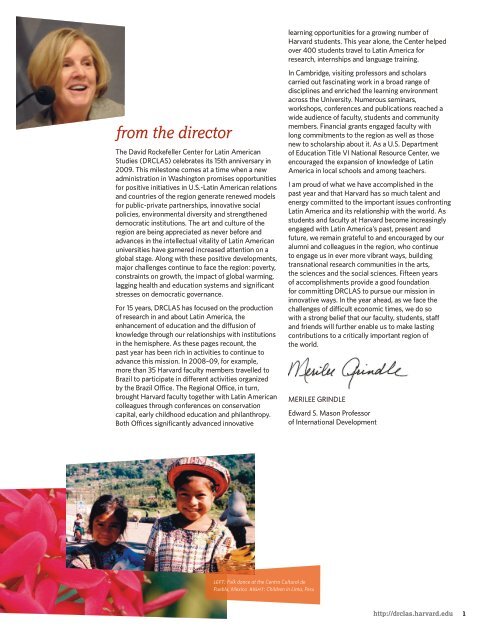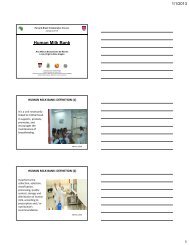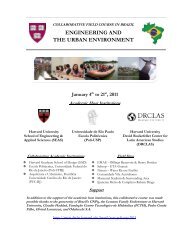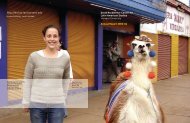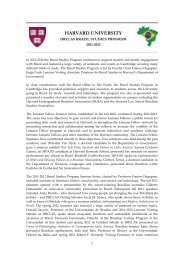from the director - David Rockefeller Center for Latin American ...
from the director - David Rockefeller Center for Latin American ...
from the director - David Rockefeller Center for Latin American ...
You also want an ePaper? Increase the reach of your titles
YUMPU automatically turns print PDFs into web optimized ePapers that Google loves.
<strong>from</strong> <strong>the</strong> <strong>director</strong><br />
The <strong>David</strong> <strong>Rockefeller</strong> <strong>Center</strong> <strong>for</strong> <strong>Latin</strong> <strong>American</strong><br />
Studies (DRCLAS) celebrates its 15th anniversary in<br />
2009. This milestone comes at a time when a new<br />
administration in Washington promises opportunities<br />
<strong>for</strong> positive initiatives in U.S.-<strong>Latin</strong> <strong>American</strong> relations<br />
and countries of <strong>the</strong> region generate renewed models<br />
<strong>for</strong> public-private partnerships, innovative social<br />
policies, environmental diversity and streng<strong>the</strong>ned<br />
democratic institutions. The art and culture of <strong>the</strong><br />
region are being appreciated as never be<strong>for</strong>e and<br />
advances in <strong>the</strong> intellectual vitality of <strong>Latin</strong> <strong>American</strong><br />
universities have garnered increased attention on a<br />
global stage. Along with <strong>the</strong>se positive developments,<br />
major challenges continue to face <strong>the</strong> region: poverty,<br />
constraints on growth, <strong>the</strong> impact of global warming,<br />
lagging health and education systems and significant<br />
stresses on democratic governance.<br />
For 15 years, DRCLAS has focused on <strong>the</strong> production<br />
of research in and about <strong>Latin</strong> America, <strong>the</strong><br />
enhancement of education and <strong>the</strong> diffusion of<br />
knowledge through our relationships with institutions<br />
in <strong>the</strong> hemisphere. As <strong>the</strong>se pages recount, <strong>the</strong><br />
past year has been rich in activities to continue to<br />
advance this mission. In 2008–09, <strong>for</strong> example,<br />
more than 35 Harvard faculty members travelled to<br />
Brazil to participate in different activities organized<br />
by <strong>the</strong> Brazil Office. The Regional Office, in turn,<br />
brought Harvard faculty toge<strong>the</strong>r with <strong>Latin</strong> <strong>American</strong><br />
colleagues through conferences on conservation<br />
capital, early childhood education and philanthropy.<br />
Both Offices significantly advanced innovative<br />
left: Folk dance at <strong>the</strong> Centro Cultural de<br />
Puebla, Mexico right: Children in Lima, Peru<br />
learning opportunities <strong>for</strong> a growing number of<br />
Harvard students. This year alone, <strong>the</strong> <strong>Center</strong> helped<br />
over 400 students travel to <strong>Latin</strong> America <strong>for</strong><br />
research, internships and language training.<br />
In Cambridge, visiting professors and scholars<br />
carried out fascinating work in a broad range of<br />
disciplines and enriched <strong>the</strong> learning environment<br />
across <strong>the</strong> University. Numerous seminars,<br />
workshops, conferences and publications reached a<br />
wide audience of faculty, students and community<br />
members. Financial grants engaged faculty with<br />
long commitments to <strong>the</strong> region as well as those<br />
new to scholarship about it. As a U.S. Department<br />
of Education Title VI National Resource <strong>Center</strong>, we<br />
encouraged <strong>the</strong> expansion of knowledge of <strong>Latin</strong><br />
America in local schools and among teachers.<br />
I am proud of what we have accomplished in <strong>the</strong><br />
past year and that Harvard has so much talent and<br />
energy committed to <strong>the</strong> important issues confronting<br />
<strong>Latin</strong> America and its relationship with <strong>the</strong> world. As<br />
students and faculty at Harvard become increasingly<br />
engaged with <strong>Latin</strong> America’s past, present and<br />
future, we remain grateful to and encouraged by our<br />
alumni and colleagues in <strong>the</strong> region, who continue<br />
to engage us in ever more vibrant ways, building<br />
transnational research communities in <strong>the</strong> arts,<br />
<strong>the</strong> sciences and <strong>the</strong> social sciences. Fifteen years<br />
of accomplishments provide a good foundation<br />
<strong>for</strong> committing DRCLAS to pursue our mission in<br />
innovative ways. In <strong>the</strong> year ahead, as we face <strong>the</strong><br />
challenges of difficult economic times, we do so<br />
with a strong belief that our faculty, students, staff<br />
and friends will fur<strong>the</strong>r enable us to make lasting<br />
contributions to a critically important region of<br />
<strong>the</strong> world.<br />
MERILEE GRINDLE<br />
Edward S. Mason Professor<br />
of International Development<br />
http://drclas.harvard.edu 1


